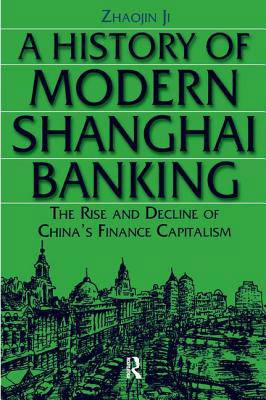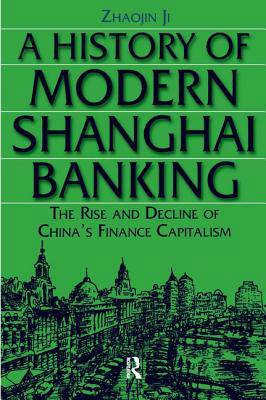
- Afhalen na 1 uur in een winkel met voorraad
- Gratis thuislevering in België vanaf € 30
- Ruim aanbod met 7 miljoen producten
- Afhalen na 1 uur in een winkel met voorraad
- Gratis thuislevering in België vanaf € 30
- Ruim aanbod met 7 miljoen producten
Zoeken
A History of Modern Shanghai Banking
The Rise and Decline of China's Financial Capitalism
Ji Zhaojin
€ 62,45
+ 124 punten
Omschrijving
As the center of capitalism in China, Shanghai banking provides a unique perspective for assessing the impact of the changes from financial capitalism to socialist planning banking in the early 1950s, and for evaluating the reform of China's banking system since the 1980s. This book offers a comprehensive history of Shanghai banking and capital markets from 1842 to 1952, and illustrates the non-financial elements that contributed to the revolutionary social and financial changes since the 1950s, as well as financial experiences that are significant to China's economic development today. The book describes the rise and fall of China's traditional native banks, the establishment of foreign banks, and the creation of modern state banks, while focusing on the colorful world of banking, finance, and international relations in modern Shanghai. It assesses the Chinese government's intervention in banking and finance during the Qing dynasty and the Republican era, as well as the concept of state capitalism after the establishment of the People's Republic. The author examines various modern-style Chinese banks through fascinating stories of Shanghai bankers. In addition, she provides detailed coverage of market-oriented international trade, banking associations, the conflicts between state and society, the government involvement in business, the management of foreign exchange, joint venture banks, wartime banking and finance, hyperinflation, corruption, and banking nationalization.
Specificaties
Betrokkenen
- Auteur(s):
- Uitgeverij:
Inhoud
- Aantal bladzijden:
- 368
- Taal:
- Engels
- Reeks:
Eigenschappen
- Productcode (EAN):
- 9780765610034
- Verschijningsdatum:
- 30/11/2002
- Uitvoering:
- Paperback
- Formaat:
- Trade paperback (VS)
- Afmetingen:
- 163 mm x 225 mm
- Gewicht:
- 494 g

Alleen bij Standaard Boekhandel
+ 124 punten op je klantenkaart van Standaard Boekhandel
Beoordelingen
We publiceren alleen reviews die voldoen aan de voorwaarden voor reviews. Bekijk onze voorwaarden voor reviews.











